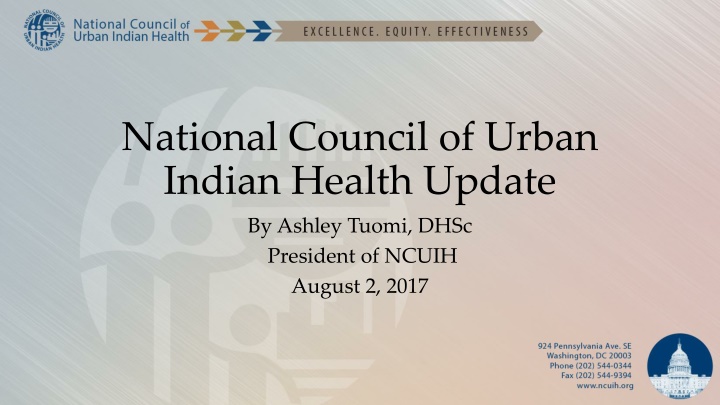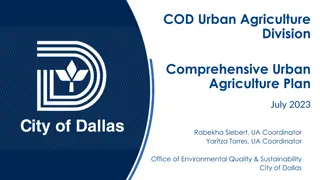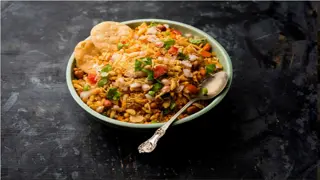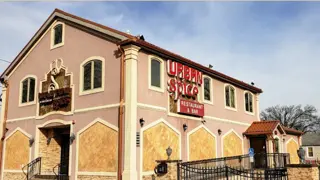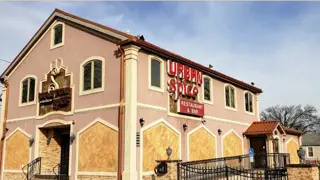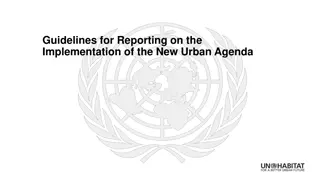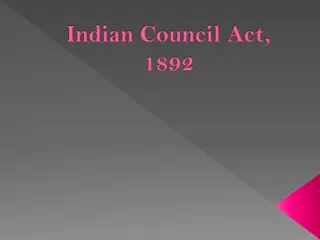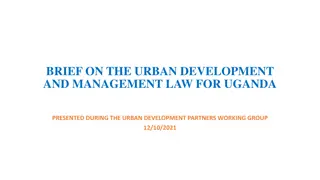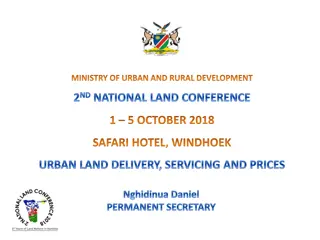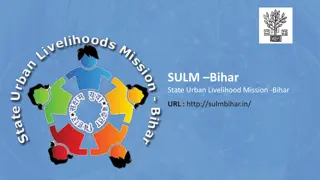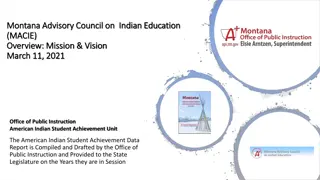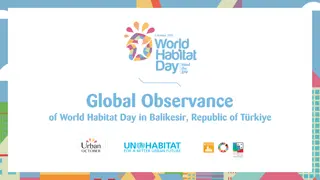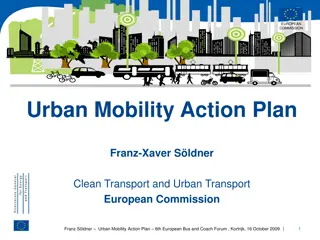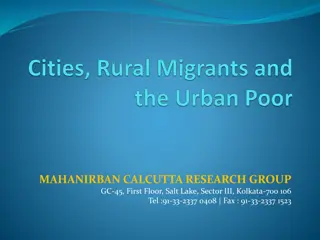National Council of Urban Indian Health Update
National Council of Urban Indian Health (NCUIH) was established in 1998 by urban Indian leaders to improve healthcare for American Indians/Alaska Natives in urban settings. The organization advocates for Indian health care with Congress and the Federal Government, offers technical assistance to 42 Urban Indian Health Programs, and collaborates with tribes to advance treaty health rights. The Indian Health Service system consists of I/T/U programs, Urban Indian Health Programs, Tribal facilities, and Federal facilities. The UIHPs were created in 1976 after the Relocation Era to provide health services off-reservation. The NCUIH, in partnership with UIHPs, focuses on various initiatives, including urban Indian youth programs and disability equality assessments in urban areas.
Download Presentation

Please find below an Image/Link to download the presentation.
The content on the website is provided AS IS for your information and personal use only. It may not be sold, licensed, or shared on other websites without obtaining consent from the author.If you encounter any issues during the download, it is possible that the publisher has removed the file from their server.
You are allowed to download the files provided on this website for personal or commercial use, subject to the condition that they are used lawfully. All files are the property of their respective owners.
The content on the website is provided AS IS for your information and personal use only. It may not be sold, licensed, or shared on other websites without obtaining consent from the author.
E N D
Presentation Transcript
National Council of Urban Indian Health Update By Ashley Tuomi, DHSc President of NCUIH August 2, 2017
National Council of Urban Indian Health Created in 1998 by urban Indian Leaders to advance health care of American Indians/Alaska Natives living in urban settings. Advocates for Indian Health Care with Congress and Federal Government. Provides technical assistance and support to the 42 Urban Indian Health Programs across the nation for implementing quality, accessible health care services.
UIHP Background IHS has a three-prong health system- IHS/Tribal/Urban Urban Indian Health Programs (UIHPs) were created in 1976 after the Relocation Era by Tribes advocating for treaty health rights off reservation. 42 Urban Indian Health Programs Nationally Increasing from 36 last year (6 NIAAA programs added to Title V)
Indian Health Service System: I/T/U Indian Health Services (I) Urban Indian Health Programs (U) Tribal (T) Federal facilities consisting of hospitals and clinics. Receive approximately 1% of IHS Budget and only one line item Compact or Contract to provide health services Specialty care through Purchased/ Referred Care dollars for life or limb Funded at 50% of need for adequate care. 3 levels of programs: Comprehensive, Limited, and Outreach and Referral 12 Regional Offices Wide variability of services
Region I Region II Chicago, IL Detroit, MI Milwaukee, WI (2) Shell Lake, WI Minneapolis, MN St. Paul, MN Sawyer, MN Kansas City, MO Region III Omaha, NE Pierre, SD Region IV Billings, MT Butte, MT Great Falls, MT Helena, MT Missoula, MT Region VI Bakersfield, CA Fresno, CA Los Angeles, CA Oakland, CA Manteca, CA Sacramento, CA San Diego, CA San Francisco, CA San Jose, CA Santa Barbara, CA Baltimore, MD Boston, MA New York City, NY Region V Portland, OR Reno, NV Seattle, WA Spokane, WA Region VII Albuquerque, NM Dallas, TX Flagstaff, AZ Phoenix, AZ Salt Lake City, UT Tucson, AZ Wichita, KA Tulsa, OK Oklahoma City, OK MO Region VIII Denver, CO
Technical Assistance and Research Center In partnership with 2 UIHPs, NCUIH developing urban Indian youth suicide and substance misuse program Just launched the first ever urban Indian youth council! Tell your urban youth (18-24) to apply! NCLUDE Project: finalized report on the implementation of the Native Communities Living United for Disability Equality (NCLUDE) assessment in urban areas
Webinars Recently hosted a webinar on Trauma 101 for Community Health Representatives Monthly Executive Director Community of Learning Behavioral Health Community of Learning- Grant writing series covered logic models, needs statements, and evaluation sections
National Tribal Members Services CY 2017: Top 30 Tribal Members Receiving Visits through Urban Indian Health Programs 0 20,000 40,000 60,000 80,000 100,000 120,000 140,000 160,000 180,000 200,000 CHEROKEE NATION, OK 188,057 VISIT QUANTITY 78,121 NAVAJO TRIBE, AZ NM AND UT 64,796 50,228 CHICKASAW NATION, OK 21,260 16,595 11,033 10,097 7,344 7,307 7,271 7,006 6,944 6,819 5,957 5,669 5,569 5,531 4,808 4,658 4,321 4,233 3,950 3,940 3,800 3,793 3,399 3,280 3,272 3,252 KIOWA INDIAN TRIBE, OK COMANCHE NATION, OK INDIAN-NON-TRIBAL MEMBER OGLALA SIOUX TRIBE TURTLE MOUNTAIN BAND CHIPPEWA, ND ROSEBUD SIOUX TRIBE, SD CADDO NATION OF OKLAHOMA CONFEDERATED TRIBES, COLVILLE RES, WA CHEYENNE RIVER SIOUX TRIBE, SD PONCA TRIBE, OK APACHE TRIBE, OK STANDING ROCK SIOUX TRIBE, ND AND SD NOTE: the NIAAA program data is NOT included in CY17 Data
2018 NCUIH Conference Celebrating 20 years June 25-29, 2018 in Pentagon City, VA Accreditation training at the pre-conference training Listening sessions on urban Indian health issues Sessions and Listening sessions on urban Indian health Gala- Urban Leadership Awards To register, please go to www.ncuih.org
Current Administration Urban Indian Updates President s IHS Budget cut $2.8 million out of over $49 million for UIHPs Almost 6% cut There are 34 UIHPs that currently receive funding, $12 million goes to headquarters Average of only $1,088,000 per program
Urban Legislative Priorities Fully Fund IHS 100% FMAP for UIHPs Federal Torts Claims Act protections for UIHPs Definition of Indian Agency-wide HHS Confer Policy Implementation of the VA-IHS MOU for UIHPs
100% FMAP for UIHPs Last year s effort to repeal-and-replace the ACA made it even more imperative to provide UIHPs with 100% FMAP. Both House-passed American Health Care Act (AHCA) and the Better Care Reconciliation Act (BCRA) considered by Senate would have cut Medicaid by at least $700 billion over ten years, which would force states to reduce benefits; narrow eligibility for benefits; and reduce provider payments.
100% FMAP for UIHPs However, both AHCA and BCRA would have exempted IHS and Tribal facilities from those cuts, but not UIHPs. Why? Because the exemption language referred to the law which provided 100% FMAP to IHS and Tribal facilities, but not UIHPs. IHS and Tribal facilities still opposed Medicaid cuts because states would not be able to protect AI/AN people from the damage to their programs. Subjecting UIHPs to the fullest extent of the Medicaid cuts was not an accident. Opposition to giving UIHPs 100% FMAP so that they could also be exempted from the Medicaid cuts was cost-driven, even though IHS has said it would cost $2.3 million.
100% FMAP for UIHPs BCRA s second draft included a provision (Section 138), which would have extended 100% FMAP to UIHPs and all providers of Medicaid services to AI/AN people, including non-I/T/U providers. Taking money for Indian health care out of the I/T/U system generated strong opposition, including from NCUIH. NCUIH has tried to keep the conversation going with the provision s supporters: If we want to use Medicaid to help AI/AN people and strengthen Indian health care, let s extend 100% FMAP to UIHPs which Indian Country strongly supports, e.g., NCAI and NIHB resolutions.
100% FMAP for UIHPs The Urban Parity Act was introduced in November to fix 100% FMAP for urbans. UIHPs need Tribes to reach out to their Senators and Representatives to say the Trust responsibility for healthcare follows our people everywhere, and in line with 100% FMAP respecting that responsibility, we need to extend that to our family in urban areas.
Federal Torts Claims Act Unlike providers at IHS and Tribal facilities, UIHP providers are not given protections against liability by the Federal Tort Claims Act (FTCA), so they must pay for expensive insurance as much as $250,000 per annum. An amendment was made to extend FTCA coverage to UIHPs, in the Restoring Accountability in Indian Health Service Act of 2017 (H.R. 2662, S. 1250).
HHS Confer Policy A Confer policy, whether through Executive Order, Agency policy, or codified through law, is necessary to fulfill the trust obligation the federal government has to American Indians and Alaska Natives. An agency-wide Confer policy within HHS would allow NCUIH members and UIHPs to have a seat at the table when policy that impacts their community is being discussed. It would not allow UIHPs to delay let alone veto HHS policies. Rather, the Confer policy would benefit HHS agencies by aiding them to craft policies and procedures which at least take into account the needs and concerns of urban Indians.
Implementation of the VA-IHS MoU IHS and Department of Veteran s Affairs entered into a memorandum of understanding (MoU) to promote better health care for AI/AN veterans. However, the MoU has not been implemented for UIHPs. Veterans are more likely to receive the care they have earned if they have more autonomy over from whom, where, and how such care is provided.
Any Questions? Contact Information: Ashley Tuomi, DHSc President@NCUIH.org Francys Crevier, J.D. Fcrevier@NCUIH.org
